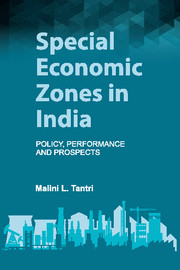Book contents
- Frontmatter
- Contents
- List of Tables, Figures, Charts and Maps
- Preface
- Acknowledgements
- Abbreviations
- 1 Introduction
- 2 Export Processing Zones to Special Economic Zones: Trajectories of Policymaking
- 3 China's Experience with Special Economic Zones under a Liberalized Regime – Highs and Lows
- 4 Performance of Special Economic Zones: Promises, Realizations and Paradoxes
- 5 An Assessment of the Fiscal Viability of Special Economic Zones
- 6 Special Economic Zones and the Question of Efficiency
- 7 Conclusions
- Bibliography
- Index
5 - An Assessment of the Fiscal Viability of Special Economic Zones
Published online by Cambridge University Press: 13 September 2017
- Frontmatter
- Contents
- List of Tables, Figures, Charts and Maps
- Preface
- Acknowledgements
- Abbreviations
- 1 Introduction
- 2 Export Processing Zones to Special Economic Zones: Trajectories of Policymaking
- 3 China's Experience with Special Economic Zones under a Liberalized Regime – Highs and Lows
- 4 Performance of Special Economic Zones: Promises, Realizations and Paradoxes
- 5 An Assessment of the Fiscal Viability of Special Economic Zones
- 6 Special Economic Zones and the Question of Efficiency
- 7 Conclusions
- Bibliography
- Index
Summary
Background
The rationale underlying the liberalization process is guided by the assumption that its spillover effects would benefit the domestic economy (mainly through accelerating the pace of economic growth) and that the resultant benefits would trickle down to all segments of the economy. In this respect, there seems to be general consensus regarding the potential of trade reform measures in terms of boosting economic growth vis-à-vis the initial restrictive trade regime. Yet, there are certain concerns voiced about the rationale behind the reform process. The most common concern about various aspects of trade reform measures is related to the possible effects on the fiscal situation of the economy, particularly the revenue front of the government which, in turn, may pose challenges to the government's efforts towards meeting the various social welfare schemes. This is considered the prime reason for resource constraints, which most of the developing economies have been facing in the post-liberalization period, following a substantial drop in the tax revenues. The empirical evidence in this respect seems to be both inconclusive and ambiguous in nature.
Nevertheless, given the additional burden that these measures are likely to place on the fiscal health of the economy, understanding the impacts of trade policy reform measures on the fiscal position of the country seems necessary in view of their known influence on the distributional aspect. In this context, Greenway and Milner (1991)2 identify two sets of factors that explain how different dimensions of reform measures may affect the domestic economy in various ways. One is based on the initial economic conditions of the economy. If a country is highly insulated and underdeveloped, then exposure to the world market through trade measures can have adverse effects on the revenue sources, particularly through a substantial reduction in tax revenues. Two, the reforms undertaken depend on the measures adopted to smoothen out the reform process. If a policy initiative is directed by quantitative restrictions on import tariffs and/or replacement of duty exemption with lower tariff rates, then there is a possibility of its increasing the revenue source of income.
- Type
- Chapter
- Information
- Special Economic Zones in IndiaPolicy, Performance and Prospects, pp. 117 - 134Publisher: Cambridge University PressPrint publication year: 2016



